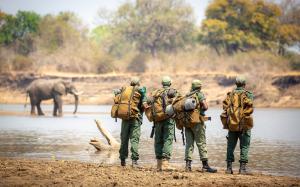Africa's Rangers are on the Frontline Protecting Nature for People and Planet: They Need Better Support
New White Paper Calls for Urgent Professionalisation of Africa’s Rangers to Safeguard Nature and Meet Global Biodiversity Goals
LONDON, UNITED KINGDOM, October 2, 2025 /EINPresswire.com/ -- A new White Paper from Tusk highlights the urgent need to improve the welfare and professional standards of Africa’s rangers, who remain on the frontlines of protecting wildlife and ecosystems but too often work without adequate support, recognition, or protection.
Rangers are critical guardians of Africa’s natural wealth. Every day they patrol forests, savannahs, wetlands, and coastlines that provide millions of people’s daily needs, sustain natural resources that drive national economies, and store vast amounts of carbon. They defend iconic wildlife such as elephants, rhinos, and lions, as well as lesser-known species vital to healthy ecosystems.
Yet these assets are under unprecedented threat from habitat destruction, illegal wildlife trade, climate change, and human-wildlife conflict. Without well-supported rangers, the world risks losing both Africa’s biodiversity and the natural systems that underpin food security, water supplies, and climate resilience. Africa lost 76% of its monitored wildlife populations between 1970 and 2020.
The new paper, Protecting Rangers to Protect Nature, warns that with only 65,000 rangers currently active across Africa, the continent has less than a fifth of the estimated 345,000 rangers it needs to meet international biodiversity targets under the Kunming-Montreal Global Biodiversity Framework, including the 30x30 goal to protect 30% of land and sea by 2030. Globally, 1.5 million rangers are needed by the end of this decade when there are fewer than 300,000 today.
Despite their vital role, rangers face extreme risks. From 2006 to 2021, Africa recorded more ranger homicides than any other region, with 591 rangers killed on duty. Yet fewer than 40% of rangers worldwide have access to life insurance and only 63% receive basic medical services. Many lack training, recognition, and safe working conditions – factors that undermine both their wellbeing and the future of biodiversity.
To address these challenges, the White Paper assesses the Ranger Welfare and Standards Initiative (RWSI), launched in 2024 by Tusk, the Game Rangers Association of Africa (GRAA), and The Royal Foundation. The White Paper argues that RWSI provides a blueprint for professionalising the ranger sector and making it a sustainable, attractive career that can recruit and retain the workforce needed to protect Africa’s natural heritage.
Key pillars of the Initiative that the White Paper lauded include:
- Affordable insurance through RangerProtect, which already covers more than 6,000 rangers with medical evacuation, accident, and disability protection, with a target of 10,000 in its first five years.
- The Ranger Welfare Pledge, committing organisations to fair pay, safe working conditions, access to insurance, mental health care, and professional development.
- Protected Area Assessments to identify and address gaps in welfare and operational standards on-site.
- Leadership and mentorship through a council of ranger leaders to strengthen professional development.
- Celebrating the ranger profession through initiatives like the recent Wildlife Ranger Challenge, which has raised more than $21 million since 2020 and supported 11,500 rangers across 24 African countries.
The White Paper calls for governments, NGOs, conservation organisations, donors, and insurance providers to embed these reforms across the continent. This includes creating continent-wide emergency response systems, establishing official ranger IDs to support cross-border medical care, and ensuring fair pay and professional standards sector-wide.
In a video address to rangers at the recent Wildlife Ranger Challenge, His Royal Highness The Prince of Wales, Tusk’s Royal Patron and head of The Royal Foundation, said: “Being a ranger extends far beyond conservation. You are educators, community leaders, researchers, mentors and protectors of cultural and historical heritage, yet this remains one of the most dangerous jobs on Earth. Every day you put your lives at risk to protect what is irreplaceable. Without you and your dedication, there is no path to protecting nature, no path to meeting our global goals, no future for the wildlife and natural world we all cherish and rely on.”
Nick Bubb, CEO of Tusk, said: "Too many rangers risk their lives without even the most basic protection. If we are serious about delivering the global biodiversity targets, we must further professionalise the ranger role – with insurance, fair pay, and recognition – so that it becomes a career young Africans aspire to join. The Ranger Welfare and Standards Initiative offers a blueprint for how this transformation can be achieved.”
Louise de Bruin, CEO of the Game Rangers Association of Africa, said: “Our priority is to stand with rangers on the ground and support the organisations that employ them. The RWSI gives us a practical way to listen to rangers, assess their needs, and work alongside partners to improve welfare standards. By focusing on uplifting the profession from within, we can help ensure rangers feel valued and better equipped to protect Africa’s wildlife and wild places.”
Benson Kanyembo, a senior ranger and law enforcement advisor for Conservation South Luangwa in Zambia, who sits on the RWSI Leadership Council, said: “Ranger recruitment is low because the job, as it stands, is not attractive enough. Rangers face extreme personal risk while their families live one accident or illness away from destitution. This is not acceptable. To protect 30% of the planet’s land and waters by 2030, rangering must become a career choice for young people.”
The White Paper concludes that protecting rangers is inseparable from protecting nature itself. By investing in ranger welfare and professionalisation, Africa can build the resilient workforce needed to secure its wildlife, ecosystems, and the communities who depend on them.
ENDS
Mike Pflanz
Plantwood Communications for Tusk
mike.pflanz@plantwoodcommunications.com
Legal Disclaimer:
EIN Presswire provides this news content "as is" without warranty of any kind. We do not accept any responsibility or liability for the accuracy, content, images, videos, licenses, completeness, legality, or reliability of the information contained in this article. If you have any complaints or copyright issues related to this article, kindly contact the author above.
